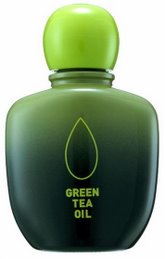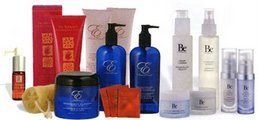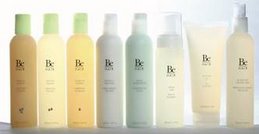
Ultraviolet rays can cause our skin to burn and age. UVA and UVB rays penetrate the epidermis and cause the skin to produce melanin. Melanin then causes skin pigmentation.
Most sunscreens provide protection from UVB, which tends to vary in intensity according to season, altitude, and time of day. UVA can burn through windows and loose-knit clothing to penetrate the dermis, or second layer of the skin, and affect collagen production.
So to provide ultimate SPF protection, use sunscreens that protect against UVA and UVB rays. You must safeguard your skin from damage and premature signs of aging caused by the sun's harmful rays.
According to the Journal of Aesthetic Science, 90 percent of skin aging is sun-related. So safeguard your natural beauty with UVA & UVB Protection SPF 46.
E International Sunblock UVA & UVB Protection SPF 46 is a gentle, daily, full-spectrum formula with natural mineral sunblocks, antioxidants. Soothing botanical extracts obstruct the sun's harmful rays on face and body. It protects against UVB rays (rays that burn the skin - most susceptible times are summer months, from 10 a.m. to 2 p.m.) and UVA rays (sun rays that cause aging - susceptible year-round regardless of weather).
E-International Sunblock UVA & UVB Protection SPF 46 is a physical (not chemical )block that does not cause skin irritation and is safe for babies 6 months and above. This unique formulation can be used for both the face and body, even on delicate / sensitive / allergy skin. E-International Sunblock can be used under makeup and is dermatologist tested.
SPF-46 rating means if your skin turns red after 10 minutes of sun exposure, after applying E-International Sunblock, your skin will be protected 46 x 10 minutes = 460 minutes or nearly 8 hours of exposure of UVA / UVB rays.
Do remember that UVA rays are present indoors, in your car and during day light hours so even if you don't go out, you will need to apply your sunblock.
E-International Sunblock Active Ingredients are:
Homosalate, Ethylhexyl, Methoxycinnamate, Benzophenone-3, Ethylhexyl Salicylate, Titanium Dioxide and Zinc Oxide.
E-International Sunblock Inactive Ingredients are:
Alerurites Moluccana Seed (candlenut) Oil, Allantoin, Aloe Barbadensis Leaf (Aloe Vera) Juice, Beta-Caraotene (vitamin A), Butyrospermum Parkii(Shea Butter), Calendula Officinalis (Pot Marigold) Flower Extract, Camellia Sinensis (Green Tea) Leaf Extract, Helianthus Annuus (sunflower Seed Oil), Prunus Amygdalus Dulcis(Sweet Almond) Oil, Symphytum Officinale (Comfrey) Leaf Extract, Zea Mays (corn) Oil, Jojoba Oil, Squalene (vitamin A),
Caprylic/Capric Triglyceride, Carbomer, Ceteareth-20, Cetyl Dimethicone, Cyclomethicone, Diazolidinyl Urea, Glycerin, Glyceryl Stearate, , Methylparaben, Panthenol, Propylene Glycol, Propylparaben, Silica, Sodium Polyacrylate, Stearic Acid, Steareth-20, Stearyl Alcohol, Triethanolamine, Water, Xanthan Gum, Alumina Hydrate
Recommended Use:
Appy to face and body 30 minutes after washing your face and applying your day moisturizer. After 10 minutes, you can apply your foundation and makeup.
Re-apply after swimming or active sports.
Commonly asked questions and basic information:
Are "sunblocks" and "sunscreens" the same thing?
No. They both provide sun- protection for the skin, but they use different ingredients and mechanisms in achieving that protection. A "sunblock" most commonly uses zinc oxide or titanium oxide to "block" the sun's harmful rays from penetrating the skin by reflecting it.
A "sunscreen" uses minerals and other ingredients to absorb the sun's harmful rays once it gets into the layers of the skin. This helps mitigate sun damage to the skin. Sunscreens are easier to wear than sunblocks as they readily absorb into the skin and do not leave a whitish residue.
However, sunblocks are more advantageous in that they do not allow penetration of the sun into skin. Their ingredients are often more harsh and may leave a whitish residue on the surface of the skin, as they do not absorb easily. This can be a problem when you wish to wear every day, or under makeup. Sunblocks are good for long periods or extreme sun exposure, swimming and sports.
What is "SPF" anyway?
SPF stands for "sun protection factor". The FDA requires all sunscreen products to put their SPF on their label. The SPF reveals the amount of sunburn protection that a sunscreen can provide an average user, when applied correctly. It is recommended that sunscreens have an SPF 15 or more.
Note: An SPF of 30 is NOT twice as strong as an SPF of 15, but rather provides about 97% protection against UVB rays compared to 93% protection against UVB rays for SPF 15.
What are UVB and UVA rays?
The sun's radiation accounts for 90% of skin aging and skin cancers. UV's are the damaging invisible ultraviolet A (UVA) and ultraviolet B (UVB) radiation from the sun. Both cause suntan, sunburn and sun damage. UVB rays are rays that burn the skin during peak sun hours (between 10AM and 2PM) in the summer months and UVA rays- are rays that cause aging year round, regardless of weather.
Can I use my sunscreen for my face on my body too?
Yes. However, sunscreens can be expensive and sunscreens developed especially for the face, even more so: they must use a more advanced science and expensive ingredients because the face tends to be more sensitive than other parts of the body. This is especially true after facial treatments or surgery of any kind. General advice: It is better to use a specially formulated sunscreen for your face on the rest of your body, if you have to, than to use a general allover sunscreen on you face.
Invest the your skin and your family's skin with a 150ml tube of E-International SunBlock UVA/UVB protection SPF 46. At just RM 179 / SGD 89 inclusive delivery within Malaysia/Singapore, you will certainly enjoy young, clear, problem free skin for years to come.






 Stumble it!
Stumble it!













2 comments:
Nice blogs.Ayurveda is Natural miracle and gradually going to accepted worldwide. i am also interested in using natural and herbal based products. Recently I used Aloe Vera based Hair Loss Shampoo which worked good for me.
Really Ayurveda is great...
Blogs are so informative where we get lots of information on any topic. Nice job keep it up!!
Rosacea Skin Treatment
Post a Comment